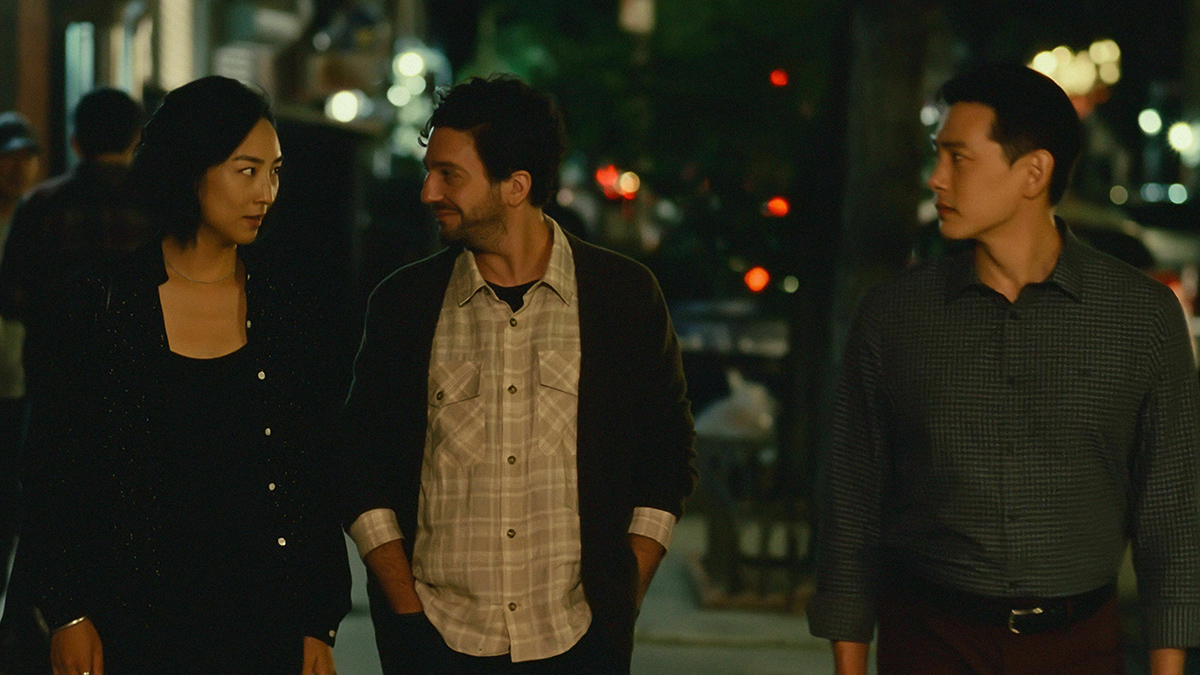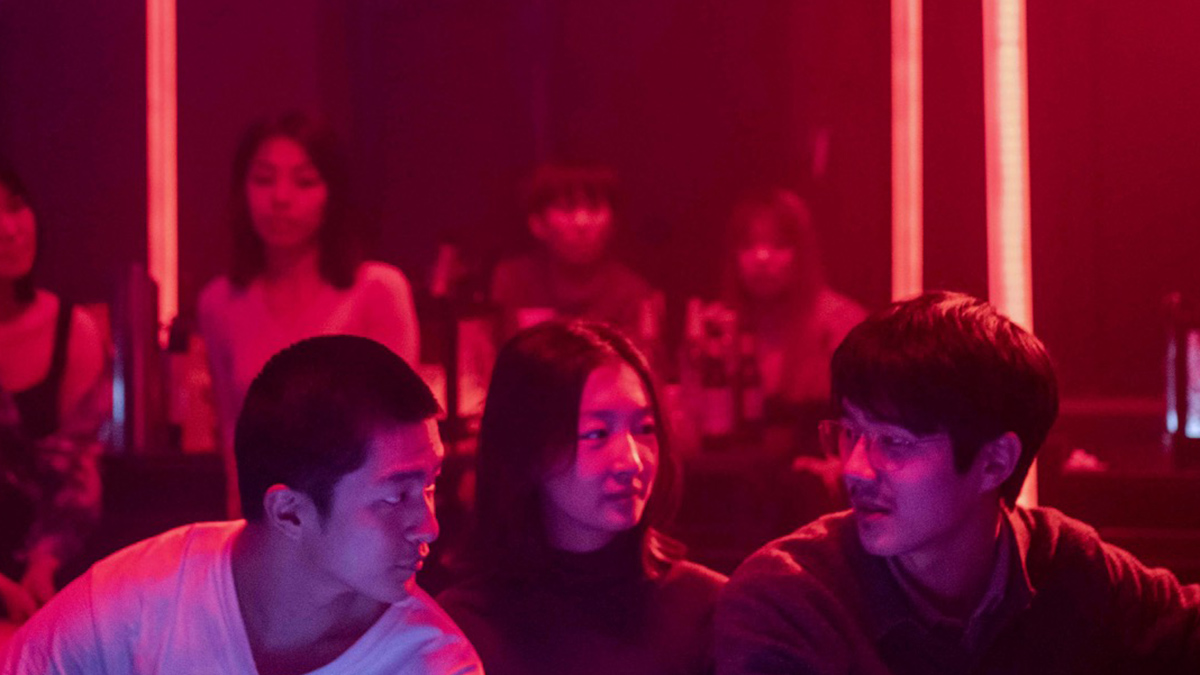An Abundance of Love: Romantic Triangles in Past Lives, The Breaking Ice and Passages

Critics Campus 2023 participant Eric Jiang discusses three MIFF films that each deal with love triangles using different narrative approaches – presenting these situations as variously damaging, ambiguous and powerfully transformative.
Love is an excessive feeling; in a love triangle, excess magnifies excess. The simultaneity of multiple relationships induces a heady overload of feeling in its participants, different lovers representing alternative aspects of their shifting desires. A love triangle is unsustainable – its participants are forced to choose what they most want. What they give up in the process of choosing is the heart of the matter.
Three recent films playing at MIFF deploy love triangles to explore various expressions of desire: Past Lives (Celine Song, 2023), The Breaking Ice (Anthony Chen, 2023) and Passages (Ira Sachs, 2023). The last of these is the most immediate and sexually charged of the three. Tomas (Franz Rogowski) flits between husband Martin (Ben Whishaw) and new flame Agathe (Adèle Exarchopolous). Each lover is different: Tomas knows (and is well known by) Martin, while Agathe is fresh and exciting – and the first woman he has ever slept with. Yet Tomas moves between the two with an undiscerning ease. Sachs cuts without warning to his interactions with one then the other, forgoing any moments of individual introspection by his protagonist. What matters to him is that he is with someone; he cannot exist by himself. Sachs amplifies a sense of being consumed by regularly using static long takes, carefully positioning Tomas so that he is facing away from the camera while Agathe and Martin each look straight at us. His individual identity has disappeared.
It’s an overpoweringly effective visual choice, one that conveys a desire absent of consideration or care. As important emotional conversations about fidelity and betrayal unfold obliquely, we’re made to feel these characters aren’t really listening to each other. Later on in the film, Tomas suggests a queer model of family where they can all participate and satisfy each other’s needs. But these propositions fall flat; Tomas has already been shown to be someone ruled by impulsive desire, which isn’t enough to sustain a new and radical approach to relationships. The fleeting potential granted by the excess of the love triangle remains unfulfilled.
In Past Lives, Song also consistently uses two-shots to convey the feelings in a love triangle. In her case, this visual approach is used mostly when depicting one side of the triangle: Nora (Greta Lee) and Hae-sung (Teo Yoo), childhood friends who grew up in South Korea and reunite in person in New York after 24 years. Her choice of framing suggests that Nora gains different things from this relationship than from her marriage with her writer husband, Arthur (John Magaro), which initially unfolds in more settled and conventional shot-reverse-shot coverage. Song sets up a sense of remove from the first shot of the film, in which she frames Nora, Hae-sung, and Arthur in a wide shot from the perspective of strangers trying to guess their relationship with one another.
A feeling of uncertainty and remove continues as the narrative progresses, Song often using medium to wide two-shots scenes with Nora and Hae-sung. Nora’s complex feelings about her relationship with Hae-sung are bluntly explained in a scene between Arthur and Nora, the latter of whom says that she’s not attracted to Hae-sung, but that there’s something about him that stirs up feelings that even she doesn’t quite understand. Her description suggests she feels on the outside of the relationship, something that the film’s visual remove emphasises. Even the characters themselves are guessing at what they might mean to one another.

Above: The Breaking Ice | Header: Past Lives
It might initially seem curious that Song shoots much of the film from a distance; indeed, it’s only during the poignant last scene, wherein Nora and Hae-sung bid each other farewell, that Song develops this convention in a moment of intense and fleeting feeling. After he says goodbye and leaves her on the sidewalk, Hae-sung calls out to Nora from the cab, and we see a flashback of a moment of farewell in their childhood, an extremely wide two-shot at night. It’s a shot that belongs to a time that we’ve already seen, but it’s a specific moment we haven’t before borne witness to, rhyming with a shot that we have seen in which they (as children) also bid each other farewell. But there’s no longer the midday brightness of childhood – the day is already over. It feels as though the past has been launched into the present, yet their relationship cannot exist in a way that it did before; and if it did, it is so brief as to be impossible to sustain. The melancholy of this moment is sublime.
In Passages, love triangles present choices, and the characters’ pursuit of these choices have hurtful consequences. In Past Lives, the characters don’t make decisions that change their lives; but the excess of feeling still has to go somewhere. So the latter film’s poetic offering is that this potential is fulfilled not in the present, but in imagined future lives.
The surplus of feeling in a love triangle can also liberate in the here and now. In Anthony Chen’s The Breaking Ice, Haofeng (Liu Haoran) embarks on a tour to Yanji, a Chinese city near the border with North Korea. The tour is led by Nana (Zhou Dongyu), and the two quickly form a sexual friendship, while also spending time with Nana’s friend Han Xiao (Qu Chuxiao), whom she continually rebuffs sexually. All characters begin the film feeling stuck in place. With the addition of a third person, however, the camerawork becomes handheld and fluid, creating an energy that conveys fun and freedom. Only through new relationships do these characters begin to unlock one another and realise the paths their lives could take.
When Haofeng and Nana first sleep together, Nana initially cuts short their sexual intimacy when Haofeng baulks at a scar from a traumatic accident in her past. But the visceral reaction is given space. Moving their conversation to another room, they allow each other to recover from a moment of disconnection, and restart their sexual encounter. The scene shows how a new relationship allows its participants to experience previously unexplored intimacy.
When Han Xiao finds out about Haofeng and Nana’s encounter, his reaction is muted, instead opting to pursue a warm friendship with Haofeng unburdened by sexual attraction; subsequently, the three of them are constantly bundled together in the frame, moving as a squad. The Breaking Ice visually accommodates the three participants of the triangle in a way the other two films don’t, and yet these characters ultimately still part ways; Chen’s film suggests that, while the excess of love triangles cannot endure forever, this same excess can have a powerful and positive transformative effect.
The film ends with each character reinvigorated by their three-way relationship. They’re shot alone but hopeful, and – unlike the bleak dysfunction of Passages or the quiet ambiguity of Past Lives – the characters are finally able to move on as individuals.